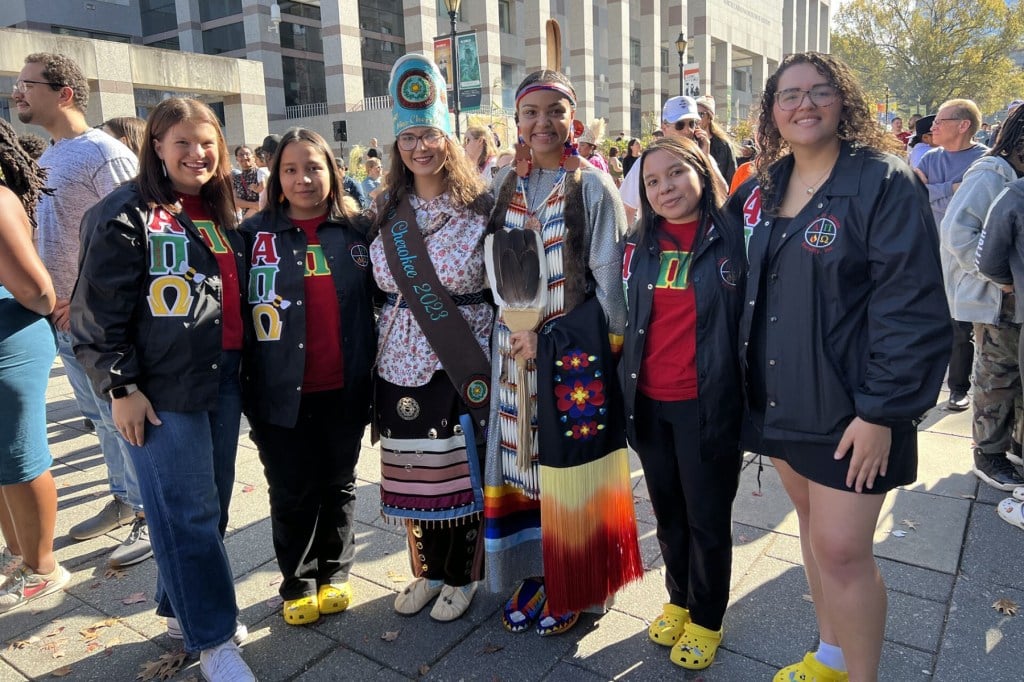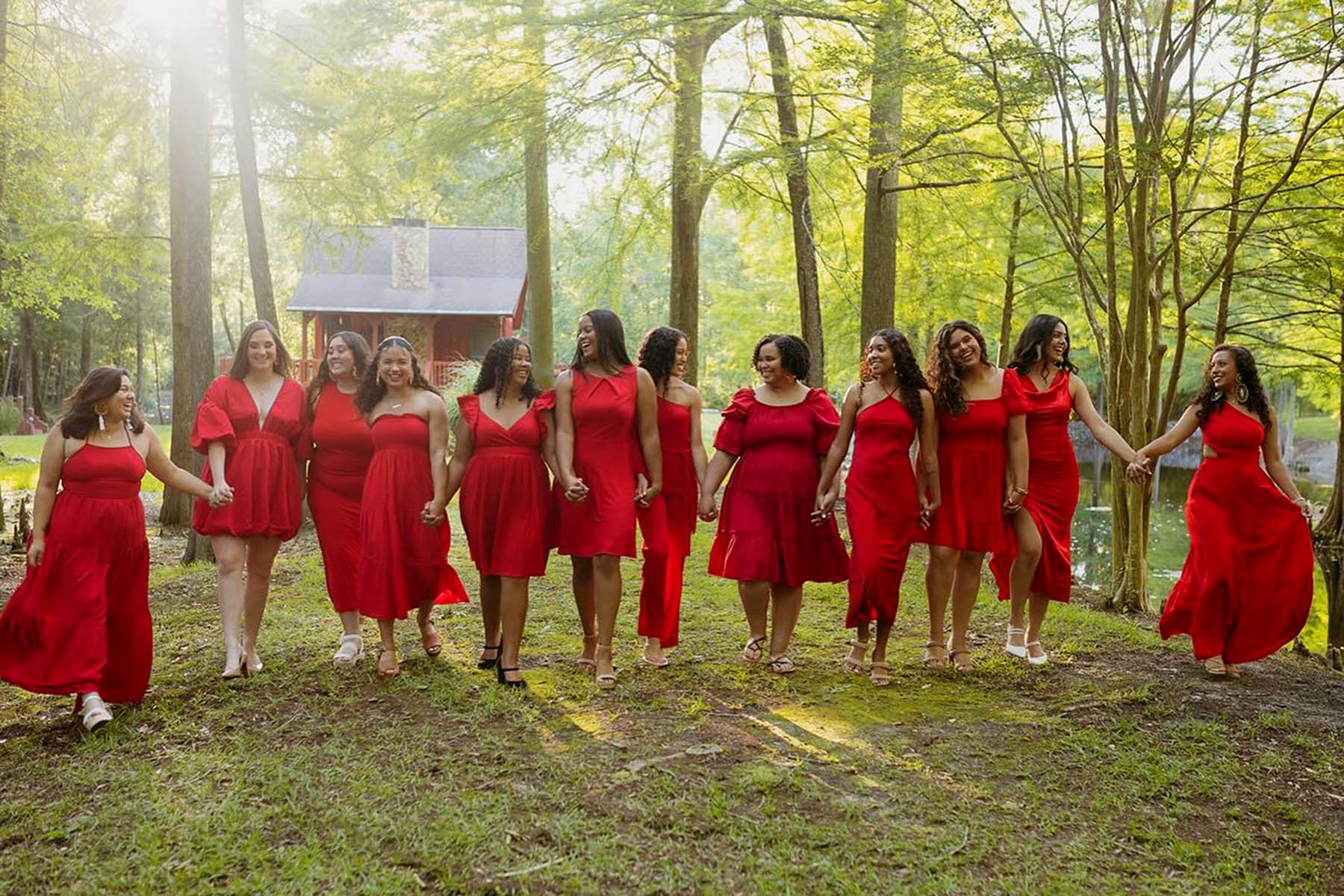Felicia Warwick grew up in Pembroke, North Carolina, seeing red jackets with green and yellow Greek letters stitched alongside the zipper. When she saw women wearing them, she knew they had to be a part of Alpha Pi Omega.
Alpha Pi Omega Sorority Inc., the country’s oldest Indigenous Greek letter organization, has chapters on 14 college campuses. At the University of North Carolina at Pembroke, a school in the marshland of Robeson County, the Alpha Pi Omega women are a sisterhood, a part of the largest Native American student population in North Carolina on their campus.
“I always wanted to be an Alpha Pi Omega woman growing up. They have always been relevant. Whenever you see a woman doing well in her career in Robeson, you know she must be an Alpha Pi Omega woman,” Warwick told The 19th.
But a flurry of executive orders from the Trump administration aimed at curbing diversity, equity and inclusion (DEI) on college campuses and elsewhere could hamper students’ ability to gather and find this kind of belonging on college campuses.
Robeson County is known for two things to many North Carolinians: The campus of UNC Pembroke — which has more than 7,000 students — and being the home of the largest tribal community east of the Mississippi River, the Lumbee Tribe, a state and federally recognized tribe without federal benefits.
As a Lumbee from Robeson County, senior student, president of the Native American Student Organization and member of Alpha Pi Omega at UNC Pembroke, Warwick feels a strong sense of self and connection to her college campus.
“Metaphorically, the ground at UNC Pembroke has the best fertilizer for us to sprout up and grow as Native students,” Warwick said.
The state has designated UNC Pembroke as a historically American Indian University. It is North Carolina’s only four-year university designated by the U.S. Department of Education as an American Indian and Alaska Native-serving institution and was founded in 1887 to educate Native American teachers. The university is home to several Indigenous student groups like the Native American Student Organization, Alpha Pi Omega and Phi Sigma Nu, the oldest and largest Indigenous fraternity.
A week after Inauguration Day, the Trump administration gave public schools and universities a strict deadline of two weeks to either eliminate DEI initiatives or risk losing federal funding. After many schools refused his orders, his administration threatened to punish noncompliant institutions by withholding federal funding from them. As of April, federal judges ruled that the Department of Education cannot keep federal funds from schools via the DEI order.
The Trump administration has proposed 17 anti-DEI executive orders since January. While seven of his orders are held up in the courts with legal challenges, 10 have yet to be threatened with lawsuits, according to Akin Gump Strauss Hauer & Feld, an international law firm tracking Trump’s executive orders and the legal status of them.
Historians like Marc Robinson, a professor of African American and U.S. history at California State University, San Bernardino, still feel the anti-DEI attacks are a threat. Campus student organizations, like Alpha Pi Omega and other Greek-letter organizations, could shutter if the Trump administration’s plans persist.
“Federally funded programs and universities currently have an administration that is opposed to the thought of being inclusive with different perspectives, histories and experiences,” Robinson said, referring to the Trump White House. The president, he said, “really wants to restrict what is taught and that reflects his own views that correspond with a Christian White elite man. They have the tools of power and I think there’s serious danger in terms of how education may be transformed in the process.”

DEI initiatives in education, government and workplaces are continuing to be targeted by Republican lawmakers across the country; in North Carolina there are multiple bills filed, some targeting higher education institutions.
Senate Bill 558, also known as the “Eliminating ‘DEI’ in Public Higher Education,” would require the University of North Carolina system and local community colleges to prohibit certain concepts and efforts associated with DEI. The Senate passed the bill and now it heads to the House of Representatives for consideration. Because of the vague nature of the bill, if passed the language has to be finalized before enacted.
“We want to have schools that are able to inspire, teach and engage students from different backgrounds, experiences and identities and Indigenous students are an important part of that,” Robinson said. “We want there to be programs and support that can speak to the Indigenous perspective and experience. We’re going to potentially lose that and all these different tools that have been built up over the last several decades to successfully support and mentor any number of different students, including Native students.”
With more than 900 women, 14 undergraduate chapters, 11 professional chapters and almost 130 tribes nationwide represented in the sorority, Alpha Pi Omega feels like a safe space for many Native students, but LaDonna Richardson, the sorority grand president and elected leader, is worried if the sorority can continue on college campuses as Trump begins to crack down on DEI.
“I believe that Indigenous women are smart and deserve to be in all the places that other women are at. However, without DEI, they will likely have a more difficult time being offered admission to colleges and universities,” Richardson said.
She said that the majority of Alpha Pi Omega undergraduate chapters exist on predominantly White institutions (PWIs), and she fears that without new enrollees their chapters will “suffer on college campuses.”
While UNC Pembroke is one of the most diverse campuses in the South, with 35 percent White students and 14 percent Indigenous students, several Alpha Pi Omega chapters sit on campuses with few Indigenous students. Arizona State University, for instance, has a student body that is 41 percent White and 1 percent Native, and Oregon State University has a student body that is 61 percent White and less than 1 percent Native.

Support The 19th
Your donation will allow us to maintain our independence and remain true to our mission to represent women and LGBTQ+ people. Together, we’ll continue to cover this ongoing American story — without fear or favor.
“There’s good reason to be alarmed and to seriously consider that academic freedom and diversity of thought may be in danger of being eliminated,” Robinson said. “And, particularly, I’m talking about within mainstream institutions.”
Alpha Pi Omega’s presence on college campuses is not only crucial for the sorority but also for the enrollment and connectedness of Indigenous students, especially with only 26 percent of 18 to 24-year-old Native American students being enrolled in college in 2022, compared with 39 percent of the overall U.S. population, according to the National Center for Education Statistics.
According to a study from the Center for Collegiate Mental Health of Penn State University in 2024, Native American students are substantially underrepresented at U.S. colleges and universities. The lack of representation often causes higher levels of academic and mental distress leading to depression and a troubled sense of belonging on campuses.
“Our organization was founded to provide Indigenous women with a place of support on college campuses, without these supports the trickle-down will be Indigenous women not being accepted to college or dropping out,” Richardson said.
Another study from Medicat, an electronic health record system that gathers data and solutions about college students, found that “Native American student organizations have a profound impact on college campuses. They empower Native American students, foster a sense of belonging and support mental health.”
The study found that Native American student organizations on college campuses contribute to the overall well-being of students.
Alpha Pi Omega often supports the Pembroke community during powwows, provides mentorship for other women on campus and hosts educational events about Indigenous issues. The sorority also practices smudging with sage to purify, cleanse and remove negative energy from their space.
The Alpha Pi Omega women honor and continually lift up their sisterhood through the Missing and Murdered Indigenous Women (MMIW) movement. MMIW is a grassroots movement raising awareness about the justice and safety of Indigenous women.
After the brutal death in 2012 of Faith Hedgepeth, an honorary sister of Alpha Pi Omega and a sophomore student at the University of North Carolina at Chapel Hill, the sorority has held vigils, raised awareness and shared the story of their sister.
Almost a decade later, Miguel Salguero-Olivares, the suspect in Hedgepeth’s killing, is now close to trial.
Raven Boone, a sister of the Alpha Pi Omega UNC Pembroke, often works to keep Hedgepeth’s memory alive by performing healing dances and carrying out spoken word written about the MMIW movement.
“She was from Hollister and from my tribal community. It is important to me that we continue to honor her because what happened to her matters and it should never be forgotten and it should never happen again,” Boone said.
Their sisterhood supports the MMIW movement and provides a safe space for Native women to belong.
Some Indigenous students in North Carolina transfer to UNC Pembroke for community. Boone, a senior student, moved colleges to get in touch with her roots and feel connected to her campus.
“I grew up as the only Native person in my school, but here [UNC Pembroke] there is a whole group Native women that I can be a part of,” said Boone, a member of the Haliwa-Saponi Tribe.
As parliamentarian and service coordinator of Alpha Pi Omega’s chapter at UNC Pembroke, Boone believes in constantly uplifting the group’s four principles of spirituality, traditionalism, contemporary issues and education.
“A Pi woman is born, not made. So, if you have the qualities of a strong and resilient woman who hones themselves to the greatest extent, then you could be a Pi woman,” Boone said.
Boone and Warwick work to uphold the sorority’s motto of “My Sister As Myself” by welcoming in and celebrating new Alpha Pi Omega members like Alyssa Chavis-Wanson, a junior and member of the Lumbee Tribe.
Chavis-Wanson says her membership into the sorority feels like friendship and support.
“Whenever somebody’s going through a hard time, we really all feel their experience, come together and help that person. Even if all they need is a hug or just to talk,” Chavis-Wanson said.
The Alpha Pi Omega women say they see their sorority as a place for healing.
“I can be vulnerable with my sisters and vulnerability creates a path for healing,” Warwick said.
Correction: An earlier version of this article mischaracterized Faith Hedgepeth's affiliation with the Alpha Pi Omega Sorority Inc. It also provided an incomplete characterization of the status of the Lumbee Tribe.







